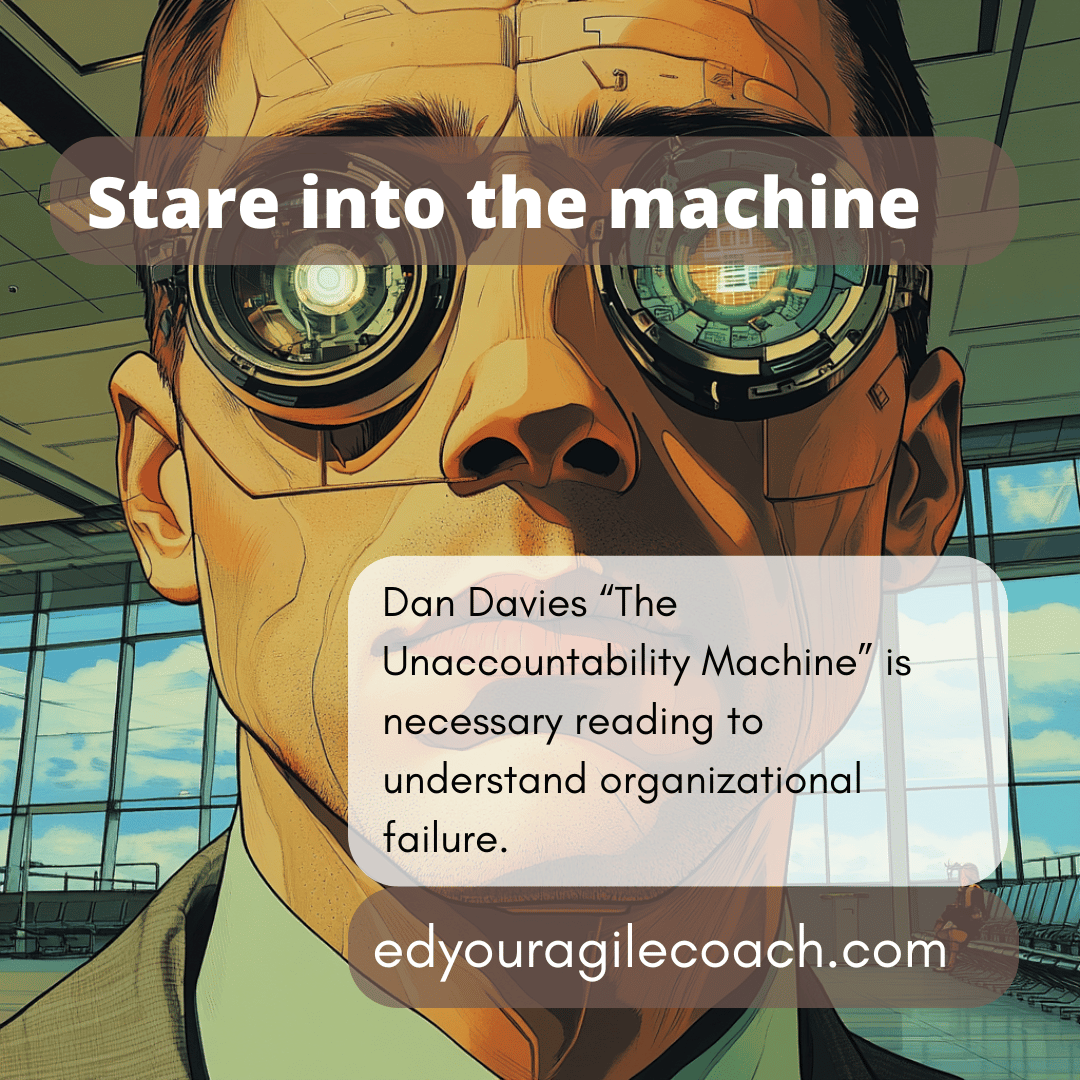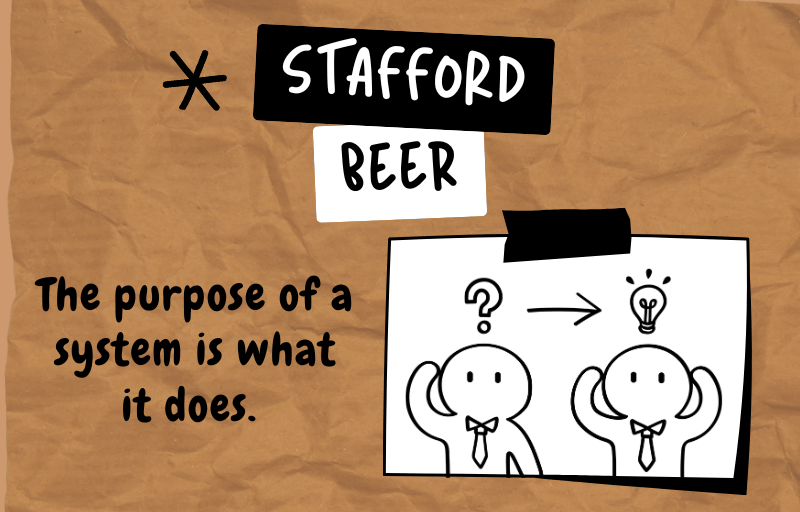Looking at the Unaccountability Machine

Nothing is more frustrating than getting stranded at an airport. You pay hard-earned money to get to your destination and find yourself in a strange airport with overpriced food and drinks waiting for the connecting flight that might not arrive. Traveling on business is more frustrating because you promised to meet someone or be somewhere, but it is not your fault that you cannot honor that commitment.
Missed flights and delays are easily forgiven if you have a transformer fire at your destination or a hurricane blows through the flight path. Still, when you cannot see the cause of the delay, it arouses feelings of injustice and powerlessness. We have a place to go and things to do, so we want to lash out when the people we pay to serve us cannot pull through. The situation is so common that it is part of the cultural landscape. Every time I travel, I see a forlorn ticket clerk dealing with an angry traveler attempting to reach their destination. The traveler and the ticket clerk are often powerless to change the situation, but they engage in this angry theater of frustration anyway.
What is true in business travel happens in technology and business. Why do the systems we create disappoint us regularly, and why is finding someone to fix them so difficult? And who we hold accountable for them. I have read Dan Davies's "The Unaccountability Machine" during the previous two months, and I think it answers some of our frustrations with contemporary life.
I stumbled on Dan Davies's book when someone printed a quotation from the book on Mastodon under the hashtag #philosophy. I was attracted to the ideas like a beaver toward a broken branch and asked about the book and the author. It wound up in my shopping cart and was on my nightstand within a week. Between work and family commitments, I dove into the text as I blogged about some of the concepts I discovered as I learned more. Now that I have finished reading it. I strongly recommend it to anyone who wants to be a successful change agent within their organization.
Davies is an economist and insider who uses the book to describe how our economy became a slow-motion disaster, which paved the way for political movements like MAGA, Brexit, the First Star Movement, and Hindutva. People are angry, like the traveler stuck at the airport, and the people they can complain to cannot help them. It is an intriguing detective story, and there are no clear villains. Instead, we are greeted by economists, business professionals, and ordinary people attempting to do business in an increasingly complicated world.
The central character in Davies's story is Stafford Beer, a philosopher, psychologist, and business consultant who set up his own consulting company and had lucrative clients like U.S. Steel. He pioneered many of the data visualizations we take for granted in today's business world and pioneered a field called Cybernetics. When we think of cybernetics today, it is the merging of humans and machines in classic science fiction novels like "Necromancer," or movies like "Blade Runner." Beer said that cybernetics was not the merging of humans and machines. Instead, it was the study of control systems. Government, the military, and businesses are horrifically complex organizations impacting millions of lives. Beer wanted to understand how those systems worked and how they failed.
From World War Two until his death, Beer explained his theories and put them into practice with his consulting company. His team was even involved in the Allende government in Argentina, helping them organize their economy before Pinochet instigated a military dictatorship. Beer's ideas were unique and radical. These ideas also helped build resilient business organizations dealing with market shifts.
If his ideas are so successful and interesting, why isn't he a household name in the management and business community? Through his writing, Davies shows how the Pinochet coup forced Stanford Beer into intellectual exile. The result is a business community today that is unaccountable and driven by the sole goal of profit maximization.
Beer is famous for the following statement –
"The purpose of a system is what it does."
The CEO and marketing department can say anything they like, but if you look at an organization and its behavior, you learn its true purpose. Thus, a petroleum company can say they are providing energy solutions. Still, they are highly efficient mining companies that extract fossil fuels from the ground and sell them for a profit. Any other rhetoric from a petroleum firm is a smokescreen obscuring its real purpose. It is the start of Beer and his understanding of how large organizations operate.
Beer's practice rose at the same time that economists began to become more mathematically rigorous. Borrowing heavily from thermodynamics and physics, economists started to explain people's behaviors in economic systems with the accuracy of air molecules in a furnace. If you understood all the correct values and plugged them into the equation, you could run simulations to help mitigate risk and predict future trends.
Davies explains why this is a problem. First, people are unique and do not behave consistently. It forced economists to create a representative human, which Davies nicknames Homo Economus. Unlike traditional Homo Sapiens, Homo Economus lives only in the moment with no memory of the past and no ambitions for the future. The fictional human also has one primary moral goal: to maximize value from every transaction with others. It sounds ridiculous to philosophers, journalists, and people on the street, but if economists don't take this shortcut, they will find predictions and equations collapse.
The second is what Joseph Schumpeter called "The Recardian Vice," which are four characteristics that economists bring to the craft that should arouse skepticism. These vices are:
- Make a model of some feature of the economy, stripping away nearly all complexity.
- Make many simplifying assumptions, often questionable in terms of empirical relevance.
- Show that their conclusion follows their assumptions, which should be easy if they have made them strong enough.
- Apply these conclusions as if they are real-world truths.
These four vices are why we should treat economists' findings more skeptically. The Great Recession of 2008 is a classic example because the mathematical models of economists said the expansion of home ownership and creative mortgage products would be a good thing for the American economy. Thanks to the Recardian vice, none of the models asked what would happen if people did not pay their mortgage bills. When that began to happen, the fancy math and assumptions no longer worked, and it destroyed billions in wealth and almost shut down the global economy.
The economics community's increasing focus on mathematics obscured Beer and his theories. Economists, with a flourish, created 'Homo Economicus' and then, with a wink, exploited the Ricardian Vice to make that focus a reality. Politicians and business leaders fell for this because the economy's operation was becoming so complicated they did not understand what was happening in real time. The formulas and equations replaced the tradeoffs necessary to manage an economy. Thus, low unemployment required higher interest rates to keep inflation in check. The formula worked until after the economic shock caused by COVID-19, when high interest rates made it impossible for young people to purchase homes, creating more inflation.
Today, we live with the consequences of this economic view of society. People are data points, but they do not behave consistently. The Recardian Vice forces us to make assumptions about human behavior, allowing the math to work but quickly spiral out of control when the assumptions change. Finally, systems are so complicated that impacting change without collective action is nearly impossible. It is why we all feel stuck in the metaphorical airport, demanding someone do something. The story continues as we examine how cybernetics works, the shareholder model of value maximization, and the breakdown of accountability.
Until next time.





Comments ()